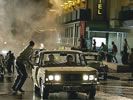Eye For Film >> Movies >> Munich (2005) Film Review
Munich
Reviewed by: The Exile

As different from War Of The Worlds as Dakota Fanning is from an actual child, Steven Spielberg's Munich unfolds with the cautious thoughtfulness and attention to detail of a police procedural. As the film opens, the real-life crime that inspired the film is under way: the hostage taking and subsequent slaughter of 11 Israeli athletes at the 1972 Olympic Games. Since the perpetrators - a Palestinian group calling itself Black September - are eager to claim credit, a minimum of crime solving is required. What is required is vengeance.
Munich initially presents revenge the way War Of The Worlds presents alien whupping, which is to say as a necessary response to a sudden and overwhelming act of aggression. There is little discussion of ethical pros and cons, no heated arguments over utility, or consequences; the hunting and killing of the Palestinian terrorists will be a simple matter of off-the-books accounting.

An unofficial commando team is quietly assembled: a nervous Belgian toy maker who understands bombs (Mathieu Kassovitz), a German antiques dealer with forgery credentials (Hanns Zischler), a fastidious cleanup man (Ciaran Hinds) and a muscled South African ideologue (Daniel Craig). Leading them is a subdued and inexperienced Mossad agent, named Avner (Eric Bana), who's reluctant to leave his pregnant wife (Ayelet Zurer), but is given little time to demur.
"Just bring me receipts!" barks an Israeli government accountant, as Avner is loaded up with cash and hustled off to Europe by his intimidating superior (a terrific Geoffrey Rush). The moment - the musty light, the dry humour, the desk littered with rubber stamps - recalls Ben Kingsley's scenes in Schindler's List and is a welcome shot of levity in an increasingly dark and melancholy film.
It is also one of the few Spielberg moments in a very non-Spielbergian movie - the aching tone and lack of a familiar structure will challenge audiences hoping for Indiana Jones-style payoffs. Munich builds like a thriller, but has no climax. Though the violence is graphic and unflinching - a bullet shearing a cheek and a knife sliding into a forehead are filmed with painterly precision - the movie maintains a fixed emotional distance. Only once, in a manipulative child-in-jeopardy scene, are we encouraged to empathise.
The hunting down of the Palestinian terrorists never feels celebratory. Instead, the team's increasing distress and ambivalence about its actions translates into petty bickering, botched assignments and worse. By positioning itself carefully between the imperatives of retaliatory justice and their fearful consequences, the movie is ultimately less a political thriller than a mesmerizing study of psychological breakdown.
Like George Clooney's Syriana, Munich refuses to simplify. Denouncing neither side (and guaranteeing attack from both), Spielberg sacrifices dramatic focus while gaining richness and present-day relevance. By uncoupling our emotions from the film's many acts of violence, he frees us to draw parallels and make connections with painfully recent history. We can also pay more attention to the movie's visual ingenuity, as he connects scenes by superimposing first and last images - a serene shot of a cloud from an airplane window explodes into gouts of plaster flying from a machine-gunned wall and papers falling from a desk transform into windblown trash on a deserted city street.
Longtime collaborator Janusz Kaminski shoots with the slightly awkward, kinetic rhythms of Seventies action movies, such as The French Connection, washing everything in pale, gritty colour. The nighttime opening scene in the garden of the Olympic village, as the terrorists slink toward the Israeli dormitories in a smoky half-light, is one of the film's most haunting images.
Tense, despondent and intermittently terrifying, Munich justifies its lengthy running time with an unusually intelligent screenplay by Angels In America creator Tony Kushner. The eclectic supporting cast, including Israeli, German, French, American and English actors, is faultless: Mathieu Amalric and Michael Lonsdale in particular are wickedly effective as, respectively, an enigmatic French informant and his apolitical father, while Marie-Josee Croze is stunning in a brief role as a sexy spy. But the film's tortured weight is carried by Bana, who plays Avner with subtly escalating paranoia.
"I like neat, durable men," Golda Meir (Lynn Cohen) tells him early in the film, knowing full well the price her operatives will pay for their patriotism. In Avner, we see an ordinary man ruined by his beliefs, which, ironically, is the most Spielbergian hero of all.
Reviewed on: 08 Jan 2006


















